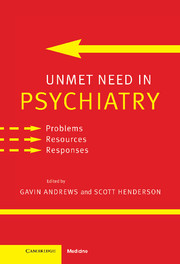Book contents
- Frontmatter
- Contents
- List of Contributors
- Preface
- Part I Unmet need: defining the problem
- Part II Unmet need: general problems and solutions
- Introduction
- 4 The epidemiology of mental disorder treatment need: community estimates of ‘medical necessity’
- 5 Some considerations in making resource allocation decisions for the treatment of psychiatric disorders
- 6 The need for psychiatric treatment in the general population
- 7 Comparing data on mental health service use between countries
- 8 The challenges of meeting the unmet need for treatment: economic perspectives
- 9 Unmet need for prevention
- 10 Meeting unmet needs: can evidence-based approaches help?
- 11 Unmet need for management of mental disorders in primary care
- 12 Is complementary medicine filling needs that could be met by orthodox medicine?
- Part III Unmet need: people with specific disorders
- Part IV Unmet need: specific issues
- Part V Unmet need: conclusion
- Index
6 - The need for psychiatric treatment in the general population
from Part II - Unmet need: general problems and solutions
Published online by Cambridge University Press: 21 August 2009
- Frontmatter
- Contents
- List of Contributors
- Preface
- Part I Unmet need: defining the problem
- Part II Unmet need: general problems and solutions
- Introduction
- 4 The epidemiology of mental disorder treatment need: community estimates of ‘medical necessity’
- 5 Some considerations in making resource allocation decisions for the treatment of psychiatric disorders
- 6 The need for psychiatric treatment in the general population
- 7 Comparing data on mental health service use between countries
- 8 The challenges of meeting the unmet need for treatment: economic perspectives
- 9 Unmet need for prevention
- 10 Meeting unmet needs: can evidence-based approaches help?
- 11 Unmet need for management of mental disorders in primary care
- 12 Is complementary medicine filling needs that could be met by orthodox medicine?
- Part III Unmet need: people with specific disorders
- Part IV Unmet need: specific issues
- Part V Unmet need: conclusion
- Index
Summary
Defining the need for psychiatric care is essentially the province of experts, and the concept of need thus differs from the empirically related concepts of demand and utilization. Despite the importance of assessing population levels of need for treatment, this has almost invariably been done by indirect methods based on consideration of prevalence, disability, and utilization. Such data do have some use, and I use the results of the household component of the British National Survey of Psychiatric Morbidity to demonstrate that there must be a considerable, if imprecisely defined, shortfall in treatment for depression and anxiety in the British population. In the Camberwell Needs for Care Survey (Bebbington et al., 1997), we adapted the Needs for Care Assessment for use in the community in an attempt to provide a detailed account of the treatment needed by individuals, whether it was provided, and if not, why. This allows statements of aggregate levels of need and its fulfillment. The results of these two studies cohere in identifying considerable unmet need for treatment of depression and anxiety. Some of this arises because treatment was not and would not be sought, some because it was not offered. The problems of remedying this situation are complex.
Need, demand and utilization
The performance of organizations and agencies responsible for delivering psychiatric care can be assessed in relation to what care is delivered, to whom, and with what effect. This is set against the background of the moral imperative of health economics: that resources should not be used in one way, if using them differently would increase the overall health benefit.
Keywords
- Type
- Chapter
- Information
- Unmet Need in PsychiatryProblems, Resources, Responses, pp. 85 - 96Publisher: Cambridge University PressPrint publication year: 2000
- 6
- Cited by



